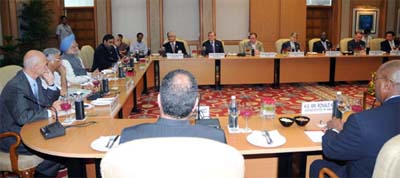In this context, the Indian initiative whereby a mini-ministerial conference was held in Delhi (on 4-5th of September) is indeed welcome. It is also heartening to note that most major WTO members and less developed countries have agreed to send their trade ministers as this will ensure that participation in this purely informal get together will be seen to be fully representative of the WTO membership. This is important as, in the absence of such a broad based representation, the mini-ministerial could well be criticized as being exclusionary in nature and focusing only on issues of interest to a few advanced and large emerging economies. Henceforth, negotiating modalities in the WTO should be such that all 150 members feel included and the process is seen as transparent and not one in which deals are reached behind closed doors by a handful of members. This will require that members of the so called New Quad have a far more active communications stance with the rest of the membership. Moreover, formation of ‘issue based negotiating groups’ which could reflect fluid negotiating geometries and coalitions should be actively encouraged. The mini-ministerial would do well to focus principally on these ‘process issues to facilitate further progress. With an enlarged membership, likely to expand even further, modalities have to be agreed upon to ensure that outcomes and also the negotiating processes are also inclusionary, equitable and transparent.
The most important change that has happened in the WTO since the ending of the Uruguay Round is the emergence of three or four large emerging economies like Brazil, China, India and South Africa which have had to be included among the small core group of negotiators. The emergence of the New Quad (US, EU India and Brazil with the latter two replacing Japan and Canada. The negotiating group often includes China and South Africa as well) marks a major transition in global trade negotiating architecture and necessitates a building up of trust and confidence amongst the members of the New Quad. The best means to build this trust is to try and achieve some collective success on issues which may require less compromise for all concerned. This would also lend support to accepting a less ambitious outcome if that is what is needed for a successful conclusion of the DDR.
The other transition being tackled in the DDR is to bring Agriculture within the ambit of the multilateral trade regime from which it has so far remained excluded. This is a historical undertaking much more strategic in its implications than was for example the inclusion of textiles and the winding up of the multi-fiber agreement. This also took very long and required tremendous efforts and compromises. Agriculture is seen as a strategic sector in the context of food security. This gives extraordinary and disproportionate clout to domestic agriculture lobbies which have been hitherto successful in thwarting any move towards agriculture under the WTO discipline. A necessary condition for achieving this would be for WTO members to agree to an international convention on food security that would essentially disallow food being used as a strategic weapon against any other member country. This would also include protocols outlawing export restrictions and permitting action against cartels by an empowered WTO. The mini-ministerial could discuss holding such a global convention under the UN aegis.
In the meantime, we may agree to move forward on the basis of the understandings that were reached in July 2008. At that time Indian negotiators were successful, having overcome strong resistance, in securing sufficient safeguards against import surges that could affect the livelihood of small and marginal farmers. A successful DDR which yields bound tariffs in NAMA that are above the applied rates, protects our small and marginal farmers and gives us greater market access for our competitive services exports is entirely in India’s interests. By calling for the mini-ministerial, the commerce minister has already signaled India’s intention to remain actively engaged. Now he only has to mobilize the political support within his party for concluding the DDR. This must be his next priority.
This article also appeared here in the Financial Chronicle.


If existing WTO rules cannot prevent governments from taking protectionist measures in trade, what is the use for the conclusion of another round of trade negotiations that is simply likely to be no secure in safeguard measures?
The fact is that the collapse in trade has been much serious than the decline in economic growth.
WTO needs to enforce existing rules as opposed to let them bended by some governments.
Does it have the courage to do it?